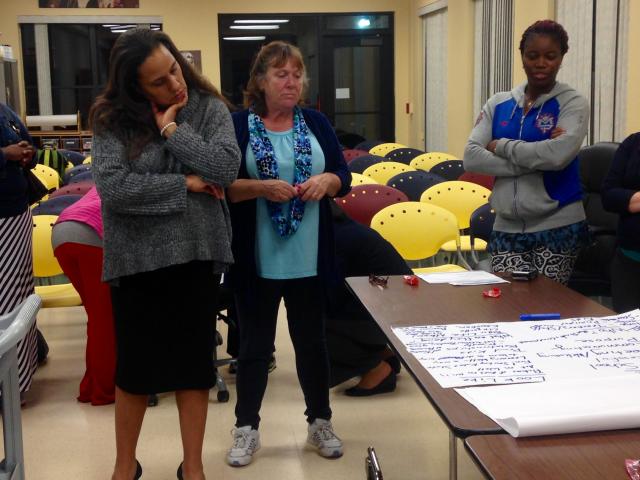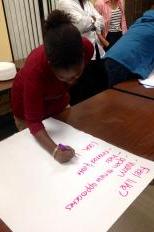






 Chela O’Connor, the district’s full service school planner, looks over what community members wrote would be characteristics of an ideal community school as part of a brainstorming activity at the listening session Wednesday, Oct. 21.: (Abby Becker/Madison Commons)
Chela O’Connor, the district’s full service school planner, looks over what community members wrote would be characteristics of an ideal community school as part of a brainstorming activity at the listening session Wednesday, Oct. 21.: (Abby Becker/Madison Commons)
By 2017-18, four schools in the Madison district will have opened their doors to a community school model, which embodies a full service approach to education.
The Madison Community Foundation awarded the Madison school district a three-year $300,000 grant in April 2015 to support community planning and implementation of four community schools — two in 2016-17 and two more in 2017-18 — Chela O’Connor, the district’s full service school planner, said.
O’Connor, who took on her role in July, is a mother of five children in the school district. One of her children influenced her to take this position. Her son was having trouble finding his place in the current system before he moved to Sherman Middle School, which she said has some of the same qualities that a community school would have.
“It’s neighbor helping neighbor,” O’Connor said at a community listening session Oct. 21 at the Packer Community Learning Center.
Schools that are interested in functioning under a community school model will apply in January 2016, according to the district. The district will perform a needs assessment at the selected schools in April or May and finalize community resources and partnerships through the summer.
The district’s strategic framework committee defines the community school model as one where a school that is a “welcoming and inclusive place that serves the identified needs of the students and the community through strategic partnerships.”
Community schools are often described as the “hub” of the community with a wide variety of services available which can include medical services, after school programming, nutrition classes and parent and family engagement opportunities — potentially even legal services.
Kevin Magee, managing attorney at Legal Action’s Madison office, attended the meeting and said schools are in a valuable position to spot problems in families that may require legal services such as eviction, losing unemployment benefits or family violence.
“These are not problems that every family is going to face, but for the ones that do, they are big problems,” he said.
He said Legal Action would help to maintain stable households, “so kids can focus on school and succeeding in school.” However, Legal Action’s role in community schools is very tentative and details still need to be worked out, Magee said.
Through a series of engagement activities at the meeting, those in attendance described what a community school would look like to them. Among the responses included a school that is open into the evening, a welcoming and inclusive environment and intergenerational activities.
Roberta Slaughter, who has a son and a granddaughter attending Sherman Middle School, said a community school should vary and reflect the needs of the student body.
“Whatever is needed for that particular school,” Slaughter said.
 Gwen Baxley writes what an ideal community school would feel like in a planning activity at a community listening session Wednesday, Oct. 21.: (Abby Becker/Madison Commons)Gwen Baxley is an educational policies graduate student at the University of Wisconsin-Madison and also sits on the framework committee for the district’s community school planning. She noted having health services on site would keep students from missing school.
Gwen Baxley writes what an ideal community school would feel like in a planning activity at a community listening session Wednesday, Oct. 21.: (Abby Becker/Madison Commons)Gwen Baxley is an educational policies graduate student at the University of Wisconsin-Madison and also sits on the framework committee for the district’s community school planning. She noted having health services on site would keep students from missing school.
“I would have to leave school often for health reasons,” Baxley said. “It would have been helpful to have that at school.”
O’Connor cited research from community schools already in action that show a full service school model raises student achievement and closes gaps, an issue Madison-area schools have struggled with.
Graduation rates at the Cincinnati Community Learning Center rose from 56 percent to 80 percent from its first year in 2000 to 2013. The achievement gap at Cincinnati also narrowed from 14.5 percent to 4 percent. The Tulsa Area Community Schools Initiatives outperformed their peers by 32 points in math and 19 points in reading.
While Madison’s community schools are still in the planning stages, O’Connor said key roles for a successful community school structure include a resource coordinator and a community school committee staffed by families, school leaders and students in addition to a lead partner that would most likely be a community organization.
These are all volunteer positions, although the resource coordinator would be paid in part by the grant funding, O'Connor said.
The community schools advisory committee will hold a second listening session Wednesday, Oct. 28 from 6 to 8 p.m. at Good Shepherd Lutheran Church located at 5701 Raymond Rd. The school board will discuss the proposed framework at its Nov. 9 meeting.
|
|
|
Welcome to the Madison Commons, a website designed to provide news and information about all of Madison's neighborhoods and a crossroads for the discussion of community issues. The name comes from the idea of a village commons, a place for news, talk, debate, and some entertainment, too, that's open to everyone.
All rights reserved. Read more about the Madison Commons and its partners.

